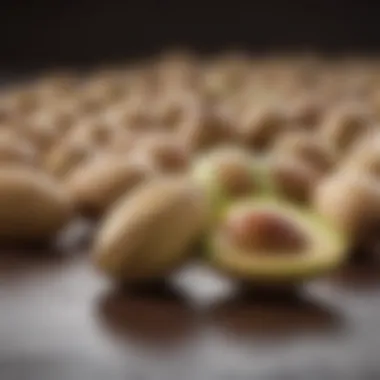Unlocking the Health Benefits of Pistachios


Intro
Pistachios have transformed from a snack often associated with social gatherings to a nutritional powerhouse recognized for their health benefits. They are rich with essential nutrients, making them a worthy addition to various diets. Understanding why pistachios are considered healthy involves examining their nutritional profile, exploring their role in promoting heart health, aiding in weight management, and ultimately contributing to overall well-being. This analysis is important for health professionals, nutritionists, and wellness coaches aiming to enhance their dietary plans with evidence-based insights.
Key Benefits
Physical Health Benefits
Pistachios are packed with beneficial nutrients. Each serving contains a noteworthy amount of protein, healthy fats, vitamins, and minerals. Notably, they are rich in vitamin B6, which plays a vital role in metabolic processes and immune function. In addition to vitamins, pistachios provide important minerals such as potassium, magnesium, and calcium.
The health benefits extend significantly to heart health. Research has shown that Pistachios may help lower cholesterol levels, thus reducing the risk of cardiovascular diseases. This is largely due to their high levels of unsaturated fat and antioxidants, which actively combat oxidative stress and inflammation.
Moreover, their fiber content contributes to feelings of fullness and aids digestion. By promoting regular bowel movements, pistachios can help prevent constipation. In terms of weight management, their low-caloric density and the fact that they are often consumed in moderation contribute positively to maintaining a healthy weight.
Mental Well-being Enhancements
The implications of nut consumption on mental health are becoming increasingly recognized. The nutrients in pistachios, particularly the high levels of antioxidants and healthy fats, have been linked to better cognitive function and mood regulation. Some studies suggest that diets rich in nuts like pistachios may reduce the risk of depression and anxiety.
Incorporating pistachios into one’s diet might also enhance overall mood and mental clarity, likely due to their influence on neurotransmitters and blood circulation. This can be valuable for professionals in the wellness sector who focus on holistic health practices.
"Pistachios not only provide physical health benefits but can also support mental clarity and emotional balance."
Practical Tips
Effective Meal Planning
Incorporating pistachios into your diet can be effortless, provided you plan strategically. Consider these ideas:
- Snacking: Choose pistachios as an ideal snack between meals. Their protein and fiber content can keep you satisfied.
- Salads and Bowls: Toss a handful of pistachios into salads or grain bowls for added texture and nutrition.
- Smoothies: Blend pistachios into smoothies for a creamy base and a nutritious boost.
- Baking: Use crushed pistachios as a topping for baked goods to add flavor and health benefits.
Quick and Efficient Workouts
While pistachios can contribute to a healthy diet, combining them with regular physical activity can enhance their benefits. Simple recommendations include:
- Pre-Workout Snack: Eat a small portion of pistachios before your workout for a quick energy boost.
- Post-Workout Recovery: Combine them with a source of protein post-exercise to aid muscle recovery.
In summary, understanding the multifaceted health benefits of pistachios provides a roadmap for integrating these nuts into dietary practices. They serve not simply as a snack but as a versatile health-enhancing food that supports both physical and mental well-being.
Intro to Pistachios
Pistachios are not just a delightful snack; they carry a significant weight in the health nutrition spectrum. Understanding their origins and culinary uses sets the stage for an deeper exploration into their health benefits. This section introduces the reader to pistachios, encapsulating their historical background and diverse applications in cooking, which helps to contextualize their presence in our diets today.
Description and Origin
Pistachios belong to the small tree species Pistacia vera, native to Central Asia and the Mediterranean region. They are one of the oldest flowering nut trees, with cultivation traces going back more than 9,000 years. Ancient cultures revered them as a source of nutrition and enjoyment. The trees thrive in hot, dry climates, which explains its flourishing in countries such as Iran, the United States, and Turkey, prominent producers in the global market today.
The tree typically takes around five to seven years to start producing pistachios and can live up to 100 years. Its long lifespan represents a commitment to quality production that continues through generations.
Pistachios exhibit a unique greenish hue that stems from their antioxidant-rich composition. The edible seed within the hard shell provides both a satisfying crunch and an array of health benefits. These irresistible treats have transcended their Middle Eastern origins and become widely integrated into various cuisines around the world.
Culinary Uses
Pistachios are versatile in culinary practices. They are often encountered in sweet and savory dishes alike. Their rich flavor and distinct texture make them a popular ingredient in desserts such as baklava and ice cream. Additionally, they are a common addition to various savory recipes, including salads, pilafs, and pesto sauces.
Here are some notable culinary uses of pistachios:
- Snacking: Roasted and salted pistachios serve as an easy and nutritious snack option, high in protein and flavor.
- Baking: Ground pistachios can elevate baked goods, adding both flavor and nutrition.
- Garnishing: Their vibrant color provides aesthetic appeal, making them ideal for topping off dishes and desserts.
- Health Promoters: As a source of healthy fats, integrating pistachios into meals can enhance nutrient absorption, which is crucial for overall health.
In summary, pistachios are not only rich in taste and texture but also hold numerous health benefits, making them integral to numerous dietary patterns. Understanding their history and culinary adaptability lays a foundation for appreciating their nutritional advantages in the upcoming sections.


Nutritional Profile of Pistachios
Pistachios are a remarkable nut that provides a rich array of nutrients. Understanding their nutritional profile is crucial for assessing their health benefits. They deliver necessary vitamins, minerals, healthy fats, proteins, and fiber. Together, these elements contribute to holistic wellness and can positively impact dietary choices.
Caloric Content
Pistachios contain a moderate number of calories. Generally, one ounce of pistachios offers around 160 to 170 calories. This caloric content makes them a satisfying snack option. Given the nutrient density, they provide considerable value for their calorie count. This balance is essential for those looking to manage their weight while enjoying flavorful snacks.
Micro and Macronutrients
Vitamins
Pistachios are a good source of several vitamins. They are rich in Vitamin B6, which is essential for protein metabolism and cognitive health. The antioxidant properties of Vitamins A and E offer protective effects against free radicals. These vitamins are particularly beneficial as they support a healthy immune system and reduce inflammation. The unique blend of vitamins found in pistachios is a solid reason to include them in a balanced diet.
Minerals
In terms of minerals, pistachios are abundant in potassium, magnesium, and calcium. Potassium is vital for maintaining healthy blood pressure, while magnesium plays a role in muscle function and energy production. Calcium, well-known for bone health, complements these minerals well. The diversity of minerals found in pistachios enhances their appeal, making them a beneficial choice for various dietary needs.
Healthy Fats
Pistachios contain healthy fats, primarily monounsaturated and polyunsaturated fats. These types of fats are crucial for heart health. They help lower bad cholesterol levels and can aid in reducing the risk of heart disease. Including healthy fats in one's diet is essential, making pistachios a wise choice for improved cardiovascular health. Moreover, they offer a satisfying taste without contributing to unhealthy fat intake.
Proteins
Proteins are another essential component of pistachios. They offer about 6 grams of protein per ounce. This protein content makes pistachios a significant plant-based protein source. It is particularly beneficial for individuals following vegetarian or vegan diets. The protein contributes to muscle repair and growth, which is vital for active lifestyles.
Fiber
Fiber is a distinguishing characteristic of pistachios, containing about 3 grams per ounce. This high fiber content promotes digestive health and aids in maintaining satiety, essential for weight management. Adequate fiber intake can help regulate blood sugar levels and support overall gut health. Hence, incorporating pistachios into the diet can facilitate various health benefits related to fiber consumption.
Pistachios are not only delightful but also a powerhouse of nutrition, offering a unique blend of vitamins, minerals, proteins, and fiber that supports an overall healthy lifestyle.
Health Benefits Associated with Pistachios
Pistachios exhibit numerous health benefits, making them an attractive choice for various diets. Their unique nutritional profile offers significant advantages, including promoting heart health, assisting in weight management, aiding diabetes management, and exhibiting antioxidant properties. Each benefit is rooted in scientifically backed data, illustrating why pistachios deserve a prominent place in everyday nutrition.
Heart Health
Cholesterol Management
Pistachios play a crucial role in cholesterol management. They contain healthy fats, particularly monounsaturated and polyunsaturated fats, which help lower levels of LDL cholesterol, commonly known as 'bad' cholesterol. The key characteristic of pistachios is their ability to influence lipoprotein profiles favorably. This aspect makes them a beneficial choice for those aiming to improve heart health. The unique feature of their cholesterol-lowering effect is attributed to high levels of phytosterols. Phytosterols can compete with cholesterol for absorption in the digestive system, resulting in lowered blood cholesterol levels, which can significantly advantage heart health.
Blood Pressure Regulation
Another significant benefit is blood pressure regulation. Pistachios are rich in potassium, a mineral that helps maintain fluid balance, thereby supporting healthy blood pressure levels. The key characteristic here is the balance of sodium and potassium intake, crucial for affecting blood pressure positively. Incorporating pistachios into the diet offers a beneficial approach as they can serve as a snack alternative to processed, salty options. Their unique feature lies in enhancing vascular function, which is essential for maintaining blood pressure. Regular consumption can lead to improved overall cardiovascular health.
Weight Management
Satiety Factors
Pistachios provide excellent satiety factors, which help control hunger. Their combination of protein, fiber, and healthy fats contributes to a feeling of fullness after consumption. The key characteristic is their ability to curb appetite, making them an advantageous choice for those managing their weight. Eating pistachios as a snack can lead to lower overall calorie intake throughout the day, due to their filling nature. The unique feature is their inherent portion control, as they are often sold in shells, encouraging slower eating and greater awareness of servings.
Metabolic Rate
Pistachios may also aid in enhancing metabolic rate. Studies indicate that nuts, including pistachios, can briefly increase energy expenditure due to their complex structure, requiring more energy to digests. The key characteristic of pistachios is their nutrient density, which can help boost energy levels effectively. This makes them a popular choice for individuals looking to maintain or lose weight. Their unique feature also includes the presence of specific amino acids, such as L-arginine, which can support healthy metabolic function.
Diabetes Management
Blood Sugar Control
For individuals monitoring blood sugar levels, pistachios can be beneficial. They have a low glycemic index, which means they do not cause large spikes in blood sugar after consumption. The key characteristic is their impact on slow digestion and absorption. This quality makes pistachios a beneficial snack for promoting stable blood sugar levels. Their unique feature is the contribution of healthy fats and protein that can modulate the body's response to carbohydrates, thus aiding blood sugar control.


Insulin Sensitivity
Insulin sensitivity is another important aspect in diabetes management. Regular consumption of pistachios has been linked to improved insulin sensitivity. The key characteristic is their richness in magnesium, which plays a role in insulin action. This makes pistachios a beneficial choice for individuals with insulin resistance or Type 2 diabetes. The unique feature of enhancing insulin sensitivity can contribute significantly to achieving better glycemic control over time.
Antioxidant Properties
Polyphenols
Pistachios are also a good source of polyphenols, which are powerful antioxidants. These compounds help combat oxidative stress in the body. The key characteristic of polyphenols is their ability to neutralize free radicals, potentially reducing chronic disease risk. This makes them a advantageous addition to a health-focused diet. The unique feature is the diversity of polyphenols present in pistachios, offering broad-spectrum antioxidant benefits.
Vitamin E
Lastly, pistachios provide a significant amount of vitamin E, another essential antioxidant. Vitamin E plays a critical role in maintaining skin health and protects cells from oxidative damage. The key characteristic of vitamin E in pistachios is its bioavailability, which enhances absorption in the body. This makes pistachios a beneficial source for those needing increased antioxidant support. The unique feature lies in their combination of vitamin E with healthy fats, which can enhance the effectiveness of this nutrient in health promotion.
Together, these health benefits of pistachios can greatly contribute to overall well-being, making them an essential inclusion in a balanced diet.
Dietary Considerations
Understanding dietary considerations is crucial when discussing the health benefits of pistachios. This section focuses on pivotal aspects such as daily recommended intake and potential allergies. Addressing these elements helps to ensure that individuals can incorporate pistachios into their diets safely and effectively, maximizing their health benefits while minimizing any risks.
Daily Recommended Intake
Pistachios are nutrient-dense, but moderation is key. The daily recommended intake can vary based on individual dietary needs. Generally speaking, a serving size of around 1 ounce, which equals about 49 pistachios, is suggested. This portion offers a balance of healthy fats, protein, and fiber while keeping caloric intake reasonable.
Incorporating this amount helps users enjoy pistachios without exceeding dietary fat and calorie limits. Here are few considerations for daily intake:
- Health Goals: Depending on one's dietary needs—whether for weight loss, muscle gain, or managing cholesterol levels—the intake might adjust.
- Overall Diet: Evaluate the rest of the diet. If other nut sources or high-calorie snacks consume daily calories, consider reducing pistachio intake.
- Allergy Check: Allergies can limit nut consumption. Awareness and sensitivity to personal health are important.
Following these guidelines can lead to better health outcomes and avoid excessive calorie consumption.
Potential Allergies
Allergies represent a significant concern for nut consumption, including pistachios. Pistachio allergies are not common but can provoke severe reactions in sensitive individuals. Understanding the potential for allergies can prevent adverse health effects.
Here are some crucial points about potential allergies:
- Cross-Reactivity: Individuals allergic to cashews or other tree nuts might also be allergic to pistachios. Understanding cross-reactivity helps to identify risk.
- Symptoms of Allergy: Reactions can vary from mild itching and swelling to more severe symptoms like difficulty breathing. It is essential to consult with a healthcare professional if unsure about sensitivities.
- Caution in Consumption: If an allergy exists, avoiding pistachios is the safest course. Reading ingredients on snack labels is critical, as pistachios often feature in mixed nut products.
Prioritizing safety by addressing allergies is vital in any conversation surrounding dietary habits.
Practical Ways to Incorporate Pistachios into Your Diet
Understanding how to include pistachios in your daily routine is essential for maximizing their health benefits. This section will explore various approaches for introducing pistachios into meals and snacks. This can enhance not only convenience but also enjoyment. As a nutrient-dense option, pistachios can help maintain energy levels throughout the day while contributing to a balanced diet.
Snacking Options
Pistachios serve as a perfect snack choice. They are portable and easy to consume, making them a convenient option. One practical way to enjoy them is by portioning out servings into small bags. This helps to control intake while providing a satisfying crunch. You can eat them plain or combine them with other healthy snacks. For instance, mixing pistachios with dried fruits offers a balance of flavors and nutrients.
Consider trying roasted pistachios or those lightly salted for different taste experiences. Another idea includes making a pistachio trail mix. Combining them with walnuts, almonds, and a few dark chocolate pieces can create a delicious but wholesome treat. These options can cater to various preferences and promote healthy snacking habits.
Cooking and Baking Uses
Pistachios can be incorporated into cooking and baking, adding unique textures and flavors. For savory dishes, ground pistachios can be used as a crust for meats such as chicken or fish. This not only gives a crispy texture but also infuses a nutty taste. They can also be mixed into sauces and dressings for an extra layer of richness.
In baking, pistachios can improve both taste and nutrition. Adding chopped pistachios to muffins or breads enhances flavor and provides a nutrient boost. Alternatively, pistachio flour can serve as a gluten-free alternative in recipes. Mixing it into pancake or waffle batter can result in a nutritious breakfast option. These uses showcase their versatility in the kitchen.
In Salads and Dishes
Pistachios are an excellent addition to salads and various dishes. They can add a pleasant crunch and a hint of richness. For example, sprinkling pistachios over a mixed green salad brings a delightful contrast to soft textures. They are also great in grain-based salads, such as quinoa or farro. The nutty flavor pairs exceptionally well with fresh vegetables and tangy dressings.
Moreover, in Mediterranean-inspired dishes, pistachios can be used in herbed sauces or pestos. Their flavor complements many ingredients well. Experimenting with pistachios can encourage creativity in meal preparations. By utilizing them in different culinary contexts, one can enjoy both the taste and health benefits they provide.


"Incorporating pistachios into your diet can be a simple yet effective strategy for improving nutrition without sacrificing taste."
Overall, practical applications for enjoying pistachios can enhance daily meals while influencing positive health outcomes. Emphasizing their benefits can lead to a more satisfying culinary experience.
Scientific Research Behind the Benefits
The exploration of pistachios and their health benefits is not merely anecdotal. Scientifically grounded research underscores the nutritional advantages these nuts offer. Studies regarding pistachios focus on various aspects such as their impact on heart health, weight management, and overall well-being. The goal of this section is to provide clarity on how scientific inquiry supports the claims surrounding the benefits of pistachios.
Understanding the evidence backing these claims is crucial for health professionals, wellness coaches, nutritionists, fitness trainers, and mindfulness instructors. With palm-sized portions of pistachios presenting an array of nutrients, the emphasis here is on empirical findings that validate their inclusion in a balanced diet. Moreover, examining scientific studies helps professionals provide informed recommendations about consumption.
Studies and Findings
Several studies have focused on the effects of pistachios on health metrics. For instance, research has demonstrated that pistachios can aid in cholesterol management. A study published in the American Journal of Clinical Nutrition indicates that daily consumption of pistachios led to reduced LDL cholesterol levels. This is critical in lowering the risk of heart disease.
In another relevant finding, a study from the Nutritional Journal revealed that participants who incorporated pistachios into their diet experienced improved satiety compared to those who consumed other snacks. This suggests that pistachios can function as an effective tool for weight management by helping to curb hunger while offering substantial nutritional value.
Additionally, research highlights the role of pistachios in supporting blood sugar control and enhancing insulin sensitivity. A clinical trial indicated that individuals consuming pistachios regularly showed an improved glycemic response, which is significant for people managing diabetes.
Here is a summary of key findings from scientific studies:
- Reduced LDL cholesterol levels in individuals consuming pistachios.
- Increased feelings of fullness and reduced overall caloric intake.
- Improved blood sugar control and enhanced insulin sensitivity.
Research Limitations
While research provides valuable insights, it is important to recognize the limitations inherent in some studies. Many studies on pistachios are conducted with small sample sizes or over short durations, which may not capture the long-term effects of pistachio consumption on health. Furthermore, some research lacks diversity in participant demographics, which raises questions about the generalizability of the findings.
Moreover, the methodologies used in various studies may introduce biases. For example, self-reported dietary habits can be prone to errors. This can lead to inaccurate assessments of the benefits linked to pistachio consumption.
Despite these limitations, existing research forms a foundation upon which further studies can build. Careful interpretation of results is essential for health professionals recommending pistachios as part of a dietary plan.
Regional and Cultural Significance
Pistachios have played an important role in various cultures and regions throughout history. Understanding these traditional and modern aspects offers valuable insights into why they are more than just a nut. The significance can be viewed from two main angles: traditional uses and their contemporary appeal.
Traditional Uses
Historically, pistachios have been enjoyed in many ancient civilizations, particularly in the Middle East. They were consumed as a snack, but also had a place in ceremonial dishes. For instance, in Persian culture, pistachios symbolize joy and fertility. During celebrations and festivals, they often feature prominently on dining tables. This showcases their value beyond simple nutrition, as they represent community and festivity.
In some Mediterranean regions, food traditions incorporate pistachios into various cuisines. Sweet and savory dishes alike benefit from their unique flavor. For example, baklava, a beloved dessert, frequently contains crushed pistachios. This not only enriches the taste but also provides additional health benefits that have been recognized for centuries.
Modern Popularity
In recent years, pistachios have seen a surge in popularity within health and culinary circles. They are viewed as a superfood, favored for their rich nutrient profile. Health professionals and wellness coaches recommend them for various diets. As consumers become more health-conscious, there is a growing interest in incorporating pistachios into daily meals.
The nut is now widely available in various forms: roasted, salted, unsalted, and even flavored. This versatility makes pistachios appealing for use in snacks, salads, and trail mixes. Moreover, their portability makes them a convenient option for busy lifestyles. This aligns with current trends favoring wholesome, nutrient-dense ingredients that support a balanced diet.
According to research, the rise in their popularity can also be linked to social media and food bloggers promoting health benefits. These platforms have helped raise awareness about the nutritional advantages of pistachios, making them a staple in many modern kitchens.
"Pistachios not only contribute to health but also connect people through culinary traditions."
Closure
In wrapping up the exploration of pistachios and their health benefits, it becomes evident how significant these nuts can be in a well-balanced diet. The culmination of their nutritional profile illustrates a vast array of advantages. From heart health to weight management, pistachios offer compounds and nutrients that promote overall wellness. Their unique blend of vitamins, minerals, healthy fats, and fiber highlights their role as a functional food.
Summary of Nutritional Benefits
Pistachios are categorized as nutrient-dense foods. Each serving delivers essential vitamins such as vitamin B6 and E, crucial for maintaining optimal health.
- Vitamins: Vitamin B6 aids in protein metabolism and cognitive function. Vitamin E acts as an antioxidant, protecting cells from oxidative damage.
- Minerals: These nuts are good sources of potassium, magnesium, and phosphorus, vital for various bodily functions, including muscle and nerve function.
- Healthy Fats: The fats in pistachios are predominantly unsaturated, which are know for being heart-friendly.
- Proteins & Fiber: With a notable protein content, pistachios can contribute to muscle repair and growth. They also provide fiber which is important for digestive health.
"Including pistachios in your daily intake can aid in reducing cholesterol levels and improving heart health."
Final Recommendations
When incorporating pistachios into your diet, moderation is key. Consider keeping your serving sizes in check. Here are a few practical recommendations:
- Daily Intake: Aim for a modest serving of around 1 ounce (about 49 pistachios) to gain health benefits without excess calories.
- Culinary Versatility: Use pistachios in various forms, whether as a snack, in salads, or as a part of baked goods. Their unique flavor can enhance many recipes.
- Storage: Store them in a cool, dry place to maintain their freshness and crunch.
- Awareness of Allergies: Be cautious if you or someone in your household has nut allergies.















